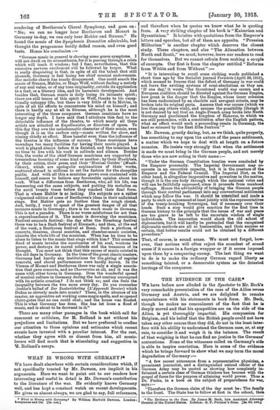WHAT IS WRONG WITH GERMANY?*
WE have dealt elsewhere with certain considerations which, if not specifically treated by Mr. Dawson, are implicit in his arguments. Here we want to point out to our readers how interesting and useful in detail is Mr. Dawson's contribution to the literature of the war. He evidently knows Germany well, and has kept a constant watch on recent developments. He gives us almost always, we are glad to say, full references,
• Whet v Wrong with Bers,anyt By Williams Hasteltt Dawson. London Longman mad Co. EEL not]
and therefore when he quotes we know what he is quoting from. A very striking chapter of his book is " Kaiserism and Byzantinism." It bristles with quotations from the Emperor's letters and speeches, but all of them are apposite. "Prussian Militarism" is another chapter which deserves the closest study. These chapters, and also "The Alienation between North and South," we must, however, leave our readers to read for themselves. Dot we cannot refrain from making a couple of excerpts. Our first is from the chapter entitled " Reforms from Within and from Without"
"It is interesting to recall some striking words published a short time ago by the Socialist journal Vorwfirts (April 29,1911), which seemed to foresee that the defeat of Germany in war could not leave the existing systems of semi-absolutism as they are, If one day,' it wrote, the threatened world war occurs and a European coalition should be directed against the German Empire, how great is the danger that the Empire, whose inner cohesion has been undermined by an obsolete and arrogant coterie, may be broken into its original parts. Assume that war occurs (which we less than any others wish), and assume the possibility (though it is not desired by us) that an Anglo-French army broke into North Germany and proclaimed the kingdom of Hanover, to which we are still pretenders, with a constitution after the English pattern. what an effect would such a proceeding create in Germany, the land so misused by the East Elbe Junkers.' "
Mr. Dawson, greatly daring, but, as we think, quite properly, has something to say upon the nature of the peace settlement, a matter which we hope to deal with at length on a future occasion. He insists very strongly that when the settlement is made we must bring in the German people, and not merely those who are now acting in their name :—
"Under the German Constitution treaties were concluded by the Emperor personally. The Imperial Government may co- operate in an executive capacity, but it is the creature of the Emperor and the Federal Council. The Imperial Diet, on the other hand, is altogether inoperative and powerless in the matter, though it is the one body through which the national voice and will can be faithfully expressed, since it proceeds from manhood suffrage. Hence the advisability of bringing the German people through their central parliament into any conventional settlement which may follow the war. It should be consulted and made • party to such an agreement at least jointly with the representatives of the treaty-breaking Sovereigns, but if necessary over their head.. Such a step would give sanction for the first time in German history to the principle that the issues of war and peace are too grave to be left to the uncertain wisdom of single individuals. The innovation would shock the old school of diplomatists, but it will hardly be pretended that the recognised diplomatic methods are all so businesslike, and their success as certain, that better results could not be obtained by a different procedure."
That, of course, is sound sense. We must not forget, how- ever, that nations will often reject the soundest of sound sense if it comes in a foreign wrapper or if it seems imposed upon them by a conquering enemy. The last thing we want to do is to make the ordinary German regard liberty as something tainted, or a democratic system as the detested heritage of the conqueror.


















































 Previous page
Previous page